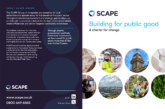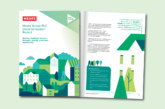The UK public sector tenders out more than £290bn annually on buying goods and services, and in 2022 aims to increase the SME share by 21%, from £76bn to more than £96bn. However, research shows that less than half (46%) of UK SMEs are currently successfully bidding for public sector contracts. With this in mind, Andrew Morrison, Founder of bid writing specialist firm AM Bid, and David Gray, AM Bid’s Managing Director, share 10 key considerations that will help businesses in their public sector bidding efforts in 2022.
- Covid-19 and business resilience: 2022 will be the third calendar year where Covid-19 will loom large. Though we are all learning to live with the constraints, uncertainties remain around further strains, more lockdowns, etc. Bidders will need to have clear answers in their bid responses for how they will cope financially, with service delivery, with sickness absences, and other potential disruptions. There is increased scrutiny now of business resilience and business continuity plans.
- Sustainability/net zero: Following COP-26 and the declared climate emergency, the UK Government now necessitates in-scope public sector organisations to require a Carbon Reduction Plan for suppliers on all contracts over £5m per annum. Procurement is being used to assist the drive to UK Net Zero (by 2050) and Scotland (by 2045), so bidders need to demonstrate how they will assist buying organisations to meet their strategic net zero objectives; how the bidder will achieve it themselves; and how they will assure it via their own supply chains. Measuring, reporting and evidencing the delivery of sustainability outcomes will be at least as stringent as social value reporting.
- Supply chains and logistics: We’ve seen some very significant issues with supply chains and logistics this year, such as the fuel supply crisis, lorry driver shortages, supply chain delays due to the triple whammy impacts of Covid, and Brexit and labour shortages. If supply chain (e.g., materials, etc) is important in your bids (and it is in many public sector bids), then make sure you can evidence how you will ensure security of supply, including what contingency plans you have in place.
- Costs: We are seeing cost increases virtually across the board but especially in fuel, energy, labour and materials costs. It’s very important that bidders make commercial assumptions, look carefully at the price increase/change control provisions in the contract and consider detailed (and in some cases tactical) clarification questions to ensure that all bidders are aware of the factors and constraints involved. Allow time within the bid window to stress test your commercial model ensuring you have a robust internal adjudication process. Enlisting the services of an external cost consultant can be hugely beneficial with their insights into market rates, current trends etc. They may also have some good cost saving and value engineering suggestions.
- Connection to buyers’ strategies: More attention is now being given to alignment with buyers’ overarching strategies (e.g. NHS bids requiring bidders to overtly align themselves with strategic objectives such as reducing waiting times/lists etc and state how their solution will help them achieve these). It is very important that your bid research goes further than just reading the tender documents. Give attention to the buyer’s strategic documents, stated policies and even to recent news releases/press coverage — all of these elements could have a bearing on your tender quality/technical scoring especially in the areas of standing out i.e. differentiation.
- Knowledge management: We are seeing enhanced requirements to provide back-up evidence in bids, with any client quotes/testimonials/proof points relating to previous delivery needing to be accompanied by contact details of a source who can verify them. Having not just testimonials, but evidence such as statistics, measured outcomes, case studies, examples of resolved complaints, innovations, added value and social value is becoming too important to just be picked up during a bid window. We recommend that bidders give thought to having someone responsible for curating the knowledge within a business and marshalling it together into a library that is kept updated. This will be a great resource for the bid writers to draw upon; it will be time-saving, reducing the calls on other staff to continually be providing similar information for different bids and importantly will also increase bid success rates.
- Cyber security: Both the public and private sectors continue to experience some significant data breaches and system hacks. Many public sector contracts mean that a bidder has access to confidential personal service user data, meaning buyers are often now requiring Cyber Essentials accreditation at minimum, and ISO 27001 Information Security Management for larger contracts. Keep up with — and in some cases get ahead of — your competition by improving your cyber security arrangements and securing external validation at the highest level your business can afford.
- Thought leadership: People who sit on evaluation panels and make or influence procurement decisions are not in a bubble, they are increasingly consumers of digital/social media. Whilst we may think that none of this could have any effect on public sector procurement decisions, as long as these decisions are made by human beings, then the subliminal and emotional elements of decision-making should not be overlooked. Give thought to how you can pique the interest of decision-makers, especially by creating content in places where they are likely to consume it. For example, look to follow your target organisations and decision-makers on social media and connect with them where this is possible. Like some of their content and in this way help you and your business get on their radar.
- Procurement events: There has been some return to in person events in 2021 and a mixed bag of virtual events. Depending on the progress in combating Covid-19, we expect to see more in person events in 2022. We are also seeing some event organisers looking at innovative hybrid models of simultaneous in-venue and live streamed options. Bidders who make the effort to connect with their markets, for example at in person events, may get ahead of other bidders who choose to hang back. However, risk assessments and Covid-secure arrangements need to be given important attention by all involved.
- Training: The UK Government Cabinet Office and the devolved administrations in Scotland, Wales and Northern Ireland all would like to see SME businesses getting a greater share of the public procurement pie. However, there remain some barriers to achieving the maximum potential from this. Research shows the vast majority of SMEs find the public procurement process challenging, and while the sector is already trying to encourage greater SME engagement, it is not easy to do well. When asked, 78% of SMEs said they would be interested in online tender training to help win more tenders, so at AM Bid we set out to use our bidding expertise to provide a solution. Ultimate Tender Coach is an online public sector training programme which covers the end-to-end bid process. It is made up of flexible online video modules that they can work through at their own pace and is supported with live weekly coaching calls with a Bid Director and a private LinkedIn members group providing the opportunity to network and share information, ideas and opportunities.









